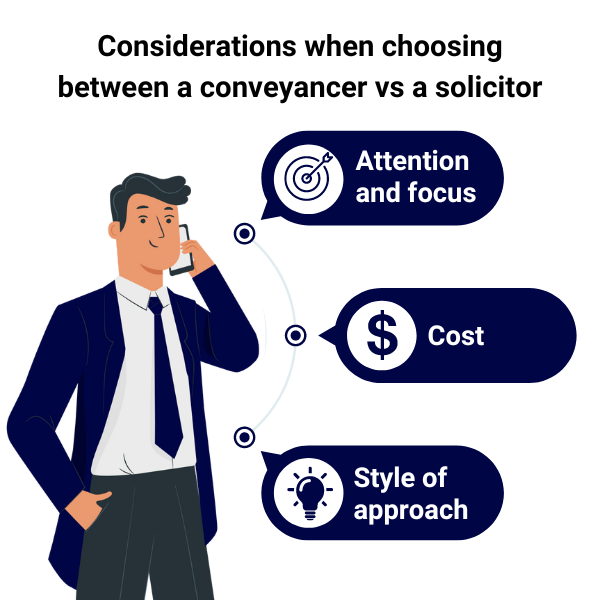Conveyancer vs solicitor: What’s the difference?
Buying or selling a home, you can either engage a solicitor or a conveyancer to facilitate the legal transfer of the property. And while both conveyancers and solicitors are qualified to carry out the transaction, there are differences in the quality and scope of services they each provide.
What are the main differences between a conveyancer and a solicitor?
The biggest difference between a conveyancer and a solicitor comes down to qualifications.
A solicitor will carry out studies across a handful of years, covering virtually every field of law including criminal law, family law, employment law, contract law, litigation, as well as property law. As a result of these broad studies, a solicitor is qualified to handle all types of legal issues, although will typically focus on a specific legal area.
A conveyancer will fall on the other end of the spectrum, and only focus studies on the legal transfer of property and property law. This makes a conveyancer uniquely specialised in handling cases relating to the sale and transfer of property. However, this also limits the extent of legal support a conveyancer can provide — should a property transaction involve issues such as an ownership dispute, they will not be able to provide legal assistance.
Naturally, this difference in qualification from study carries over into the scope of services that both a conveyancers and property solicitor can offer.
Considerations when choosing between a conveyancer vs a solicitor
Now that we’ve gone over the main differences between the two, the question comes down to whether a conveyancer or solicitor is preferable when buying or selling a property.
Attention and focus
A conveyancer can offer a competitive edge over a solicitor when it comes to most standard property transactions, as this is their bread and butter. Generally speaking of course, but often a conveyancer will have more familiarity with the process involved (as it’s their primary duty), making the entire engagement efficient and smooth sailing.
A solicitor will have the expertise to handle a property transfer, but may also operate across a range of other legal services that require their attention. This can result in being less involved with the property transfer, potentially slowing down the process.
The focus that a conveyancer will have on each property transaction allows them to offer undivided attention to clients.
Cost
A conveyancer will usually charge a flat fee for their services. Solicitors, on the other hand, typically charge clients based on an hourly basis for the legal services provided.
Engaging a conveyancer is widely considered to be more cost-effective than a solicitor. Solicitors can charge higher rates due to the broad range of legal expertise they hold, which may or may not end up being applicable to a property transaction.
Depending on how long or how complex the conveyancing process takes, the cost of a solicitor can add up.
Style of approach
Solicitors are used to a more confrontational approach in their legal cases; there’s often some sort of pushback from other parties.
Property transactions differ from such legal cases as there has already been an agreement made between the buying and selling parties. The legal actions required exist to ensure that everything is accounted for rather than determine the rights and wrongs of a dispute.
Conveyancers are used to applying a cooperative approach in resolving the property transaction which helps move the process along quickly, making it ideal for both sides of the deal.
Which should I choose for a property transaction?
The choice between a conveyancer and solicitor for a property transaction is clear — a conveyancer’s services and focus make them ideal for most typical property transactions.
That’s not to say that solicitors don’t have their place in property transactions, however. The expertise of a solicitor can be invaluable when dealing with a complex property transfer where a number of other legal issues may arise, such as a dispute of ownership, easements, or tax-related legal considerations.
At Entry Conveyancing, we have teams of conveyancing solicitors and dedicated conveyancers across Sydney and Melbourne. Our team specialise in delivering fast and efficient property transfers for residential and commercial properties of all sizes.






